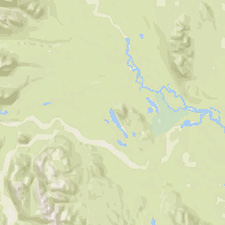The Snake River has a relatively short drainage that flows out of the south side of the Kigluaik Mountains. The bridge crossing is typical of the wide, vegetated valley with tall, dense willows growing along the banks of a narrow, swift- flowing river.
Moose Viewing
The broad riparian habitat supports some of the highest densities of moose along the Nome road system.
The lower river moves lazily and boaters may put in at the bridge for a short day-long float trip downstream to take-out locations close to the airport or harbor. The road is not maintained beyond the bridge in winter and is typically impassible due to deep snowdrifts. However, a walk, ski, or snowmachine ride along the Snake River valley may reveal the tracks of moose, ptarmigan, red fox, snowshoe hare, mink, river otter, and beaver in the snow.
Birding
Northern harrier hunt for songbirds and small rodents where tundra meadows meet the hillside willows. Migrating sandhill crane pass overhead in May and September. Look for Arctic tern, cliff swallow, and tree swallow around the bridge and yellow warbler and Wilson’s warbler in willow thickets nearby.
Salmon Viewing
Pink and chum salmon run upriver in late July and early August and coho salmon are found in the river from mid- to late August. Arctic grayling and Dolly Varden also are found in these waters.

